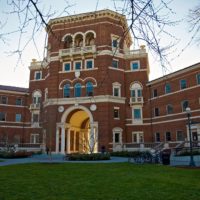
CORVALLIS, Ore. – Oregon State University is helping the National Institutes of Health to harness the power of big data in the fight against COVID-19, the disease caused by the novel coronavirus SARS-CoV-2.
The NIH’s National Center for Advancing Translational Sciences is creating a centralized, secure digital enclave for collecting medical record data from COVID-19 patients throughout the United States. The enclave is part of an effort called the National COVID Cohort Collaborative, or N3C, designed to help scientists expedite their understanding of the disease and to develop treatments.
For example, can we predict who might have severe outcomes if they have COVID-19? What drugs are most likely to exacerbate or be protective against COVID-19?
Vast amounts of clinical data are being generated that can be used to push research forward, but the datasets are hard to meld in meaningful ways, said Melissa Haendel, director of OSU’s Translational and Integrative Sciences Laboratory.
“In the United States, there hasn’t been a standardized way to collect, harmonize, securely share and reproducibly analyze all the COVID-19 data being generated,” she said. “N3C is overcoming these varied challenges in order to rapidly transform clinical data into useful knowledge that can improve clinical care and understand the long-term impact of COVID-19.”
Haendel stressed that multiple security measures will safeguard patient privacy throughout the data collection process and that the data will not include information such as names or addresses.
The cohort collaborative is funded by the National Center for Advancing Translational Sciences and is a partnership among NCATS-supported Clinical and Translational Science Awards Program hubs and the National Center for Data to Health, or CD2H.
The N3C platform will enable machine learning approaches and rigorous statistical analyses that require large amounts of data to reveal patterns.
“The N3C pulls in extensive capabilities, and by leveraging our collective data resources, unparalleled analytics expertise and medical insights from expert clinicians, we can catalyze discoveries that address this pandemic that none of us could enable alone,” said Haendel, who directs the CD2H program at the Oregon Health & Science University School of Medicine.
In addition to OSU and OHSU, CD2H consists of the University of Washington, Johns Hopkins University School of Medicine, Sage Bionetworks, the Scripps Research Institute, Washington University in St. Louis, the University of Iowa, Northwestern University and the Jackson Laboratory.
The CD2H was created in 2017 by a five-year, $25 million grant from NCATS.















